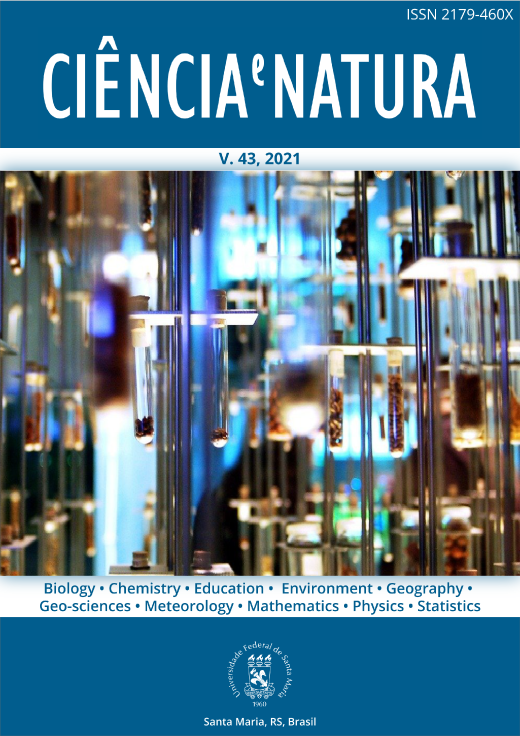The Hardy–Weinberg equilibrium in the ABO blood group system: a case study in Engenheiro Coelho – SP
DOI:
https://doi.org/10.5902/2179460X43422Keywords:
Population genetics, Biomathematics, Hardy-Weinberg equilibrium, Bernstein modelAbstract
The genetics of human populations is the branch of Genetics that studies the dynamics of genes in natural populations, aiming at the elucidation of mechanisms that alter their genetic composition. Among the fundamentals of this science is the Hardy-Weinberg Equilibrium, which determines that gene frequencies remain unchanged and genotypic proportions reach a stable balance, obtaining the same constant relation with each other over time. To demonstrate this principle, it is necessary to admit that the studied population is not subject to evolutionary factors or to those that alter genotypic frequencies, increasing the homozygosity. More specifically, it is necessary to assume that the population obeys the following premises: random mating, infinite population, non-overlapping generations, in addition to the absence of mutation, selection and migration. More than recalling basic concepts of Genetics and Statistics, this article aims to describe the Bernstein Method for verifying the gene equilibrium for blood types. The research is concluded with a case study in the city of Engenheiro Coelho - SP, where the Hardy-Weinberg Equilibrium for blood types in the population is verified.
Downloads
References
Amabis, J. M., Martho, G. R. (1994). Biologia das populações: genética, evolução e ecologia, 1. ed. Editora Moderna, São Paulo.
Batissoco, A. C., Novaretti, M. C. (2003). Aspectos moleculares do sistema sanguíneo ABO. Revista Brasileira de Hematologia e Hemoterapia, v. 25(n. 1), p.47–58.
Beiguelman, B. (2008). Genética de populações humanas. SBG, Ribeirão Preto.
Bernstein, F. (1924). Ergebnisse einer biostatischen zusammenfassenden betrachtung ûber die erblichen blutstrukturen des menschen. Klin Wschr, v. 3, p.1495–1497.
Freire-Maia, N. (1974). Genética de populações humanas. HUCITEC, Editora da Universidade de São Paulo, São Paulo.
Griffiths, A. J. F., Wessler, S. R., Lewontin, R. C., Gelbart, W. M., Suzuki, D. T., Miller, J. H. (2006). Introdução à Genética. 8. ed. Guanabara Koogan S.A., Rio de Janeiro.
Grimmett, G., Stirzaker, D. (2001). Probability and Random Processes. Texts from Oxford University Press, OUP Oxford, New York.
Hartl, D. L., Clark, A. G. (2007). Principles of population genetics, 4. ed. Sinauer Associates, Sunderland.
IBGE (2020). Diretoria de pesquisas, coordenação de população e indicadores sociais: estimativas da população residente com data de referência 1 de julho de 2019.
Lewis, R. (2004). Genética humana: conceitos e aplicações, 5. ed. Guanabara Koogan S.A., Rio de Janeiro.
Magalhães, M. N., Lima, A. C. P. (2010). Noções de probabilidade e estatística, 7. ed. Editora da Universidade de São Paulo, São Paulo.
Oliveira, V. F. (2019). Modelagem matemática em genética de populações. Dissertação de Mestrado, Instituto de Geociências e Ciências Exatas, UNESP, Rio Claro, p.89.
Published
How to Cite
Issue
Section
License
To access the DECLARATION AND TRANSFER OF COPYRIGHT AUTHOR’S DECLARATION AND COPYRIGHT LICENSE click here.
Ethical Guidelines for Journal Publication
The Ciência e Natura journal is committed to ensuring ethics in publication and quality of articles.
Conformance to standards of ethical behavior is therefore expected of all parties involved: Authors, Editors, Reviewers, and the Publisher.
In particular,
Authors: Authors should present an objective discussion of the significance of research work as well as sufficient detail and references to permit others to replicate the experiments. Fraudulent or knowingly inaccurate statements constitute unethical behavior and are unacceptable. Review Articles should also be objective, comprehensive, and accurate accounts of the state of the art. The Authors should ensure that their work is entirely original works, and if the work and/or words of others have been used, this has been appropriately acknowledged. Plagiarism in all its forms constitutes unethical publishing behavior and is unacceptable. Submitting the same manuscript to more than one journal concurrently constitutes unethical publishing behavior and is unacceptable. Authors should not submit articles describing essentially the same research to more than one journal. The corresponding Author should ensure that there is a full consensus of all Co-authors in approving the final version of the paper and its submission for publication.
Editors: Editors should evaluate manuscripts exclusively on the basis of their academic merit. An Editor must not use unpublished information in the editor's own research without the express written consent of the Author. Editors should take reasonable responsive measures when ethical complaints have been presented concerning a submitted manuscript or published paper.
Reviewers: Any manuscripts received for review must be treated as confidential documents. Privileged information or ideas obtained through peer review must be kept confidential and not used for personal advantage. Reviewers should be conducted objectively, and observations should be formulated clearly with supporting arguments, so that Authors can use them for improving the paper. Any selected Reviewer who feels unqualified to review the research reported in a manuscript or knows that its prompt review will be impossible should notify the Editor and excuse himself from the review process. Reviewers should not consider manuscripts in which they have conflicts of interest resulting from competitive, collaborative, or other relationships or connections with any of the authors, companies, or institutions connected to the papers.






